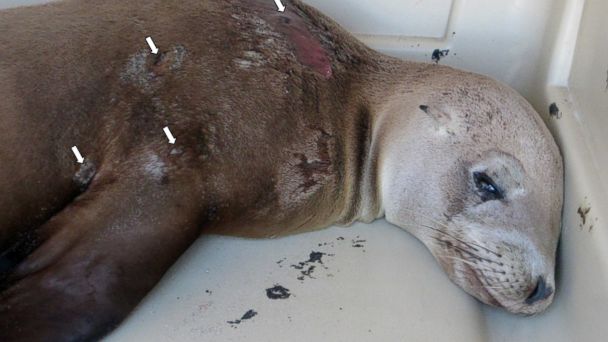Sea Lions Getting Shot Along Malibu Coast

Jonsie Ross
California wildlife experts and cops are baffled - and angered - by whoever is shooting sea lions whose corpses are washing up along the Malibu coast.
"I have no idea why people would shoot a sea lion," Jonsie Ross of the California Wildlife Center told ABC News.
Since August, four sea lions have washed up along the Malibu coast. The most recent were on Oct. 10 and 11.
Mike Remski, marine mammal rehabilitation manager at the California Wildlife Center acknowledges the higher number of incidences in recent weeks.
"The past couple of weeks, there have been more than usual animals stranding on the beaches. We are getting a greater number with bullet holes in them," Remski said. "For the ones that wash-up dead, necropsies are done and we try to retrieve the bullets to find a cause of death. If they're alive, they're sent immediately to the rehabilitation center [Marine Mammal Care Center (MMCC)] in San Pedro."
Ross was part of the rescue team that tried to save the sea lion that washed onto shore on Oct. 10. She told ABC News affiliate KABC that she remembers both the clusters of people gathered around the animal, and its four deadly gunshot wounds.
Remski was the one who found the dead sea lion on the Big Rock Beach on Oct. 11.
"That one washed up dead. It was an adult female sea lion," Remski said. "I took a look at it because a rescuer wasn't available and I took it down to the California Wildlife Center and it went to San MMCC ultimately. I happened to be there when they were doing the x-rays and it looked like a larger bullet, larger than a .22 and it went into the shoulder and most likely was the cause of death of the animal."
Not only is shooting these animals inhumane, it's also illegal.
"We always get increased shootings of sea lions when there is fishing going on whether it's squid or other fishing offshore," Remski said. "We are very used to seeing animals with bullets in them especially during squid season."
Squid fishing season begins Oct. 1 and attracts dozens of fisherman who embark on the Malibu waters. But while the waters attract squid, the squid in turn attract the sea lion that prey on them.
Sea lions are among the mammals protected under the federal Marine Mammal Protection Act, which Congress passed in 1972. Fishermen are permitted to sway mammals by use of highly-regulated, nonlethal deterrents, such as firecracker-like "seal bombs" used to scare the animals away from their nets. However, critics and activists allege that guns are used in spite of the act.
Diane Pleschner-Steele, executive director of the California Wetfish Producers Association, a group that "promotes sustainable fisheries and fosters cooperative research," says that she doesn't believe the fisherman are responsible for the fatal attacks.
"We don't condone illegal activity and our members do not condone illegal activity, period. And they don't practice it either," Pleschner-Steele said. "Just because we have fishery at the same time, doesn't mean they are responsible, and it's unfortunate that people put two and two together. They're sentencing the fishery without proof."
Pleschner-Steele says that most of the fisherman she spoke with said they don't even have guns on the boat.
"We don't have direct poof, because the sea lions aren't exactly talking," Remski said. "Unless someone tells on them, agents can't catch them, unfortunately. They need hard evidence and need an eyewitness on the boat, and of course anybody on the boast isn't going to risk their jobs."